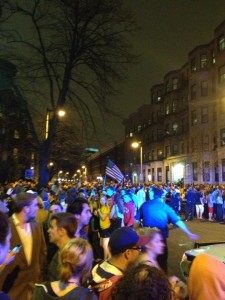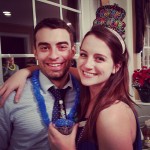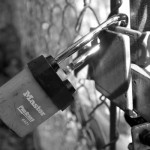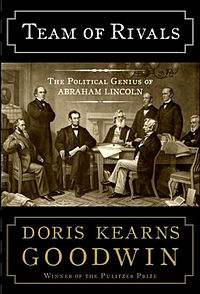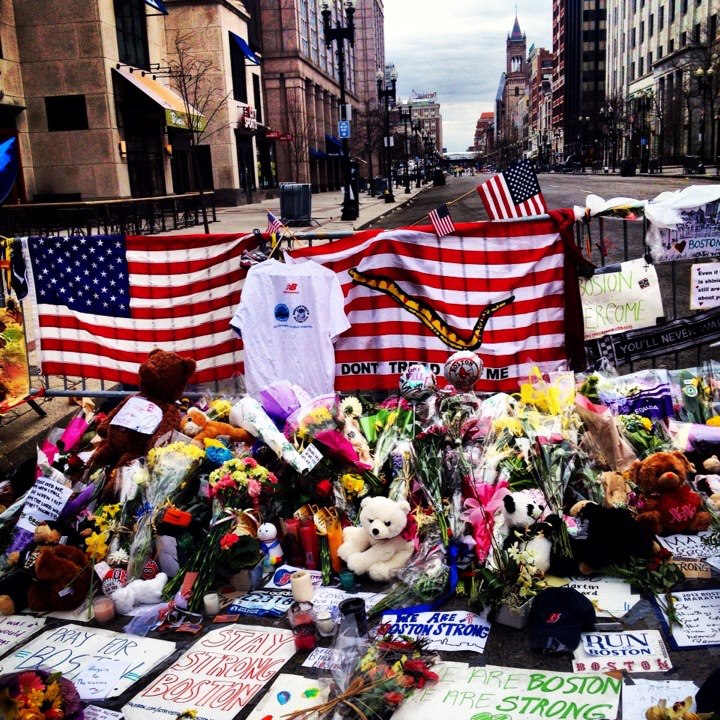
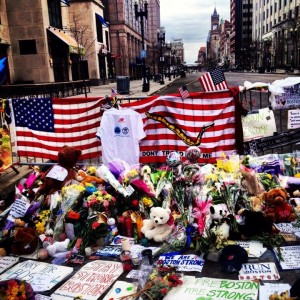 A week ago today, two bombs exploded at the finish line of the Boston Marathon. Two hours before they exploded, I’d been standing at the second bomb site.
A week ago today, two bombs exploded at the finish line of the Boston Marathon. Two hours before they exploded, I’d been standing at the second bomb site.
For the past week, the bombings are all anyone’s been able to talk about. It’s a “where were you when…” situation that’s sickeningly similar to 9/11 recollections. I’ve waited several days to try and grapple with, to evaluate how I feel about everything. I know it’s something I want to write about, something I want to encapsulate in the foreverness of the Internet, but something deeply personal, too.
The United States of America was assaulted on Monday. Boston was assaulted on Monday. The 190 people that were killed or maimed in the past week were assaulted. And so was I.
AB kept asking me if I was okay because I wasn’t talking a whole lot (To be fair, I’ve been really sick and couldn’t talk if I wanted to). Mostly, I’ve just kept quiet because I don’t really know how to process very well. When 9/11 happened, I was 9 years old and 3,000 miles away, so everything seemed eerily distant. Most of my classmates had never seen New York, and most didn’t have family working to rescue victims and clean up the aftermath—For the most part, I felt very alone in my naive perspective of terrorism.
Though the scope of this attack is only a fraction of the World Trade Center, it’s admittedly more impactful for me. I’m older, for starters; and I’m a witness to the horror. I’ve walked that street, I’ve seen people crutching through the city with bandages covering their shrapnel wounds. I’ve come to adopt this incredible city as my own in the past 4 years, and I was deeply offended that someone could attack it.
On Friday morning, I woke up at 3:00 a.m. to get ready for my internship. When I’d gone to bed hours earlier, two bombing suspects had been identified in photos by the FBI, and an MIT security officer had been shot and killed. Overnight, the events had escalated far quicker than I ever would have thought.
I got into the newsroom early and spent the next 13 hours stalking the Twittersphere, calling sources, running memos between the newsroom and the studio, and doing—for lack of a more comprehensive term—journalism.
Halfway through the day, I drove back into the city to pick up a friend. I was chilled by the empty streets, how a thriving “Hub” of a city could turn into a war zone in minutes. My city looked downright apocalyptic. I let the radio gab in the background and drove my friend to the newsroom, where producers promptly put her on air. A native Russian, she translated the living suspect’s social media page, summarized Slavic news coverage, and kept me company. Everyone was so thankful, and anchors and producers told me I’d done great work…
Me? I’d brought in a girlfriend. But then I kind of realized that that’s what journalism is: It’s networking and pooling resources, sharing knowledge—and I’d helped that process. With her knowledge and my journalistic intuition, we were able to pull relevant information that helped our viewers contextualize the situation.
If I’ve ever had a doubt in my mind whether I loved journalism or not—and we all know I have because it’s been on this blog—it was dispersed on Friday. In a sad way, that fiery, crazed mess of a newsroom was everything that makes me love journalism. Every scoop is a race, and even when I lost, I just kept running.
Hours later, I stumbled into AB’s apartment, crumpled onto appropriately named “Fancy Couch,” and fell asleep to the familiar sounds of on-air ad-libbing. I woke up to the 6 p.m. newser wherein officials basically said “We have no leads and can’t keep people contained anymore.”
When I woke up next, he’d been caught.
What happened then is Boston history. I changed my clothes, gathered my friends and quite literally went skipping down the street. People wore flags like capes, climbed on top of their friends shoulders, and drank beer in the streets, shouting “MURICA” every opportunity they could. Students mobbed Hemenway Street and shouted “B-P-D!” while officers tried to disperse the crowds. I high-fived uniformed officers on the street and watched while one girl passed out Redbull to the exhausted policemen.
I’m not blind to the irony: A mob of drunken students thank officers who’ve been working 16 hours straight and just want to return to their families—officers who have reason to be especially suspect of college-age kids in crowds. It didn’t make sense, but it totally made sense. They were heroes.
What stands out most to me this week is the swift and efficient action taken by the city’s officials, citizens, and visitors. Immediately after the blasts and against all natural impulse, strangers rushed to help those who were hurt. Physical therapy students became triage experts, and ordinary citizens became heroes.
Bystanders and stores sent in thousands of photos from the day, such that the FBI and investigators were able to analyze and confidently point out the accurate perpetrators in only four days. None of the victims that made it to the hospital died, and the community has thus far raised more than $1 million for the victims.
After the bombers (whom I’ve carefully called “suspects” up until today—but can with confidence now call them what they are) killed an MIT security officer, police efficiently chased them down, despite being showered with explosives and gunfire. And after they chased the men to Watertown, police reported from every single town surrounding Boston to aid in the search.
When the mayor requested—not mandated—that people stay inside, they did (except for the few necessarily stupid reporters). And during the lockdown, airlines waived fees, hotels waived room service charges, and the city’s people cared for one another.
The terror rocked our world, but we fought back with textbook responses, with compassion, with a little thing called “Boston Strong.”
Today, at 2:50 p.m., I bowed my head in Northeastern’s Centennial Quad for a moment of silence, but the city wasn’t silent. Bells rang out—from churches and buildings all around the city. Boston’s history is rich, its people resilient and full of pride and patriotism. It seems oddly fitting that a story this awful should start with bombings and end with bells—that’s Boston strong.
